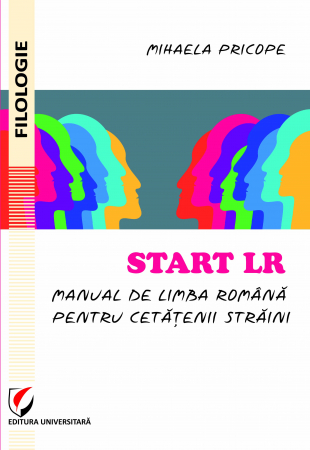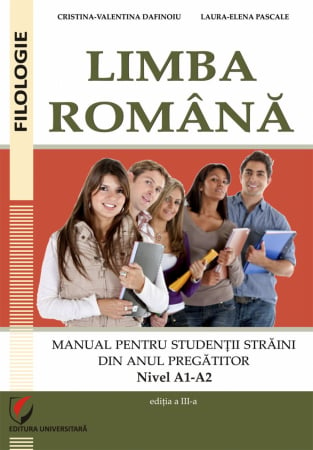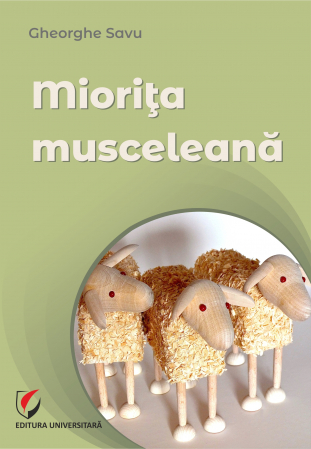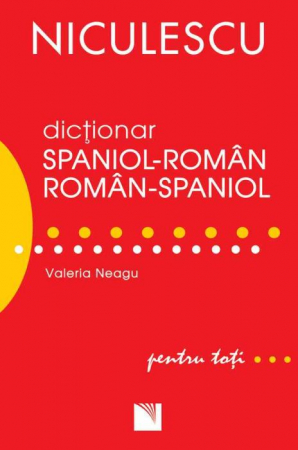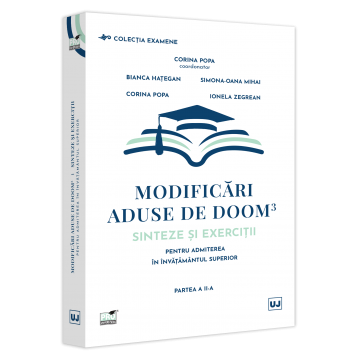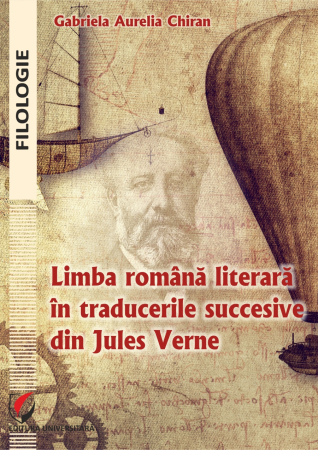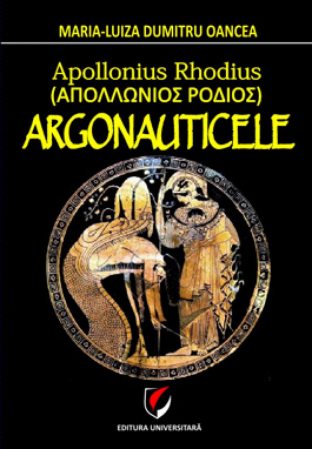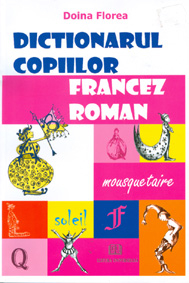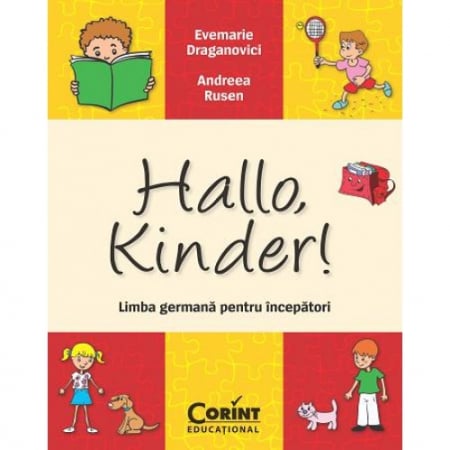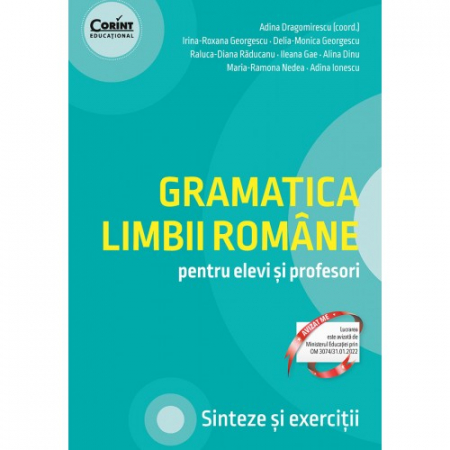ISBN: 978-973-749-767-3
Publisher year: 2009
Edition: I
Pages: 389
Publisher: Editura Universitară
Author: Marina-Oltea Păunescu
- Description
- Download (1)
- Content
- Authors
- Reviews (0)
Finding a good thesis topic, to give a theoretical framework, choose its analytical instruments, set up the first hy-potheses, devise a plan, write, finally - as many steps-mandatory courses in the format of each researcher . As much of systematic recall expressions finally give them an aura of definitive evidence and, as such, indisputable. As if suff isait to invoke the master and the disciple to be applied to ensure the success of this great intellectual enterprise. In reality, how many question marks, anxiety and de-braids we saw during this journey alone to the shore of certainty? How many dropouts?
The idea of this book I first came in contact with students currently writing their thesis. For the vast majority of them, this was the first - and perhaps the only - exercise of personal construction of a certain magnitude. Even if they are distinct realities, thesis, as a master's thesis or master's assume, mutatis mutandur, the use of skills and know-how similar. In each case, we need to find a subject, some-ner a problem, propose a plan to build a demonstration. All this, in the almost total lack of experience of its kind, and achievements - and practical - that result.
My own experience in the preparation of my thesis was to as-decisive. Facing difficulties are those of all PhD students - with some exceptions - I thought it useful to make them leave their condition of non-prohibited words or guilty, so they can be experienced and performed So many questions like-tions inherent in any training course. This book does not ultimate and definitive solution. It is neither a method nor an infallible guide to writing. What I propose, that is rather the story of a personal experience.
One wonders why this story deserves to be brought to the attention of students and young researchers. In academia, it is customary for a thesis or published without the action is otherwise have values other than that of a mere subordination to the standard. The same custom is in its final version, a thesis is a refined product, free from the matrix failures and theoretical attempts aborted. The thesis is designed as a place of certainty. Although after a search, it does not usually book a course, but a result, it is not a path, but a culmination.
Personally, I lived the years of maturation and to elaborations of my thesis as a real research that would lead me questions and sometimes disturbing questions, the answers supposed to solve. I also believe that the very meaning of the research is for a large part in the indeterminacy of the year it opened: we must find its way step by step, by-times confusing, sometimes s' lost, a path can always turn short Overexertion, but which is expected to gradually becomes clear during the questioning. But this questioning-ment, the PhD student is necessarily only one to raise, in solitude often difficult to bear. Solitude interviewed face reality, that is to say the mystery of a body at first opaque, it takes a long courtship that he agrees to reveal his secret. Of course, the teacher can always propose their own questions, that tea-sard will have to solve. It seems however that at this mo-ment then breaks the delicate relationship between the question and answer, since a response personal appearance will be grafted on a matter, it does the is not. However, once completed, the thesis will erase the trace of the issues that have done born, leaving only the reassuring certainty of answers.
For my part, I chose to deliver my thesis in the whole course of my research, risky business, because not consistent with academic purposes, faithful to the tripartite model now enshrined: the state of the question, thesis itself (theoretical framework, surgical instruments and concepts, issues, assumptions, argu-ment, analysis, interpretation of data), conclusion. The choice to keep my initial assumptions, initially dropped, then recover and restate, is indicative of slips and hesitations are those of all graduate students in search of a theoretical comfortable.
Indeed, the coming into view is not always a guarantee of my intellec tual parturition: the latter is most often acquired a journey born of dialogues, hesitations and innumerable readings in the rarefied atmosphere of libraries. It is possible that our initial theoretical options are not necessarily the best, or - steady situation - that the choice of a di-rector of the thesis also forces us to assume its own universe theory. When you choose is not yet known, since not know what it is sought, a predefined theoretical horizon can reassure it comes with its limitations and gives us benchmarks from which to build. Many PhD students have the chance of not having to look further and see their ideas germinating in the fertile soil of a theory or another.
On the other hand, the objective of the research once fixed, having borrowed a certain theory or to have installed in a predefined theoretical horizon may be a source of discomfort. Often the re-search of a valid model or theory better able to ensure the authenticity of a project can justify certain infidelities compared to the initial options. In other words, the development of a thesis is never devoid of surprises. In this regard, the plan of a thesis - like that of a master's or master - is not de-finishing and binding. Far from being fixed, it follows the path of initia-tion a thought.
-
Le masque et la plume - Les formes d un enjeu: l individuation discursive
Download
UN MOT DE L'AUTEUR / 5
INTRODUCTION / 19
CONSIDÉRATIONS PRÉLIMINAIRES / 29
0.1. Rationalité interrogative et rationalitépropositionnelle / 29
0.2. La constitution du champ rhétorique / 36
0.2.1. Rhétorique et dialectique / 36
0.2.2. La rhétorique comme technique de vérité / 37
0.3. Les rhétoriques néo-dialectiques / 46
0.3.1. S. Toulmin / 47
0.3.2. C. Perelman / 52
0.4. Rhétorique et questionnement:pour une conception problématologique du langage / 56
CHAPITRE I
La notion de thème à la lumière du paradigme propositionnel / 66
1.1. L,Ecole de Prague et la perspective fonctionnelle / 69
1.1.1. Le thème comme point de départ psychologique ou positionnel / 71
1.1.2. Thème et dynamisme communicationnel / 77
1.1.3. Le thème comme «ce dont on parle»
La notion d« aboutness » / 78
1.2. La grammaire fonctionnelle / 84
1.2.1. Thème - Rhème / 84
1.2.2. Donné - Nouveau / 85
1.3. L'approche cognitive / 87
1.4. Les approches textuelles et discursives / 90
CHAPITRE II
La notion de «débat». Descriptions et paramètres / 104
2.1. La notion de «débat» à l'intérieur du paradigme propositionnel / 104
2.1.1. Première modélisation du débat : Enonciation -mise en question [D1 <-> D2] / 106
2.1.2. Conséquences de l'inscription du débat dans le modèle [D1 <-> D2] / 107
2.1.3. Limites du modèle [D1 <-> D2] / 113
2.2. Vers une descriptionproblématologique du débat / 120
2.2.1. Argumentation et problématisation. Mise en place du modèle Question - Réponse [Q - R] / 120
2.2.2. Conséquences de l'inscription du débat dans le modèle Q - R / 123
2.3. Aspects formels du débat radiophonique. Description du format communicationnel du Masque et la Plume / 124
2.3.1. Discours de l'animateur / 127
2.3.2. Discours des allocutaires / 129
CHAPITRE III
La notion d«enjeu» / 132
3.1. Première hypothèse sur lindividuation discursive / 135
3.2. Deuxième hypothèse sur lindividuation discursive / 151
CHAPITRE IV
Le couple question - réponse et le problème de lindividuation discursive / 152
4.1. Le couple question - réponse / 152
4.1.1. Traitement des questions en sémantique vériconditionnelle / 153
4.1.2. Les logiques érotétiques / 155
4.1.3. Aspects gnoséologiques de la question / 161
4.1.4. Aspects pragmatiques du couple Q - R / 163
4.1.5. Le rôle de la question dans l'interprétation du sens des énoncés / 165
4.2. Types de questions / 168
4.3. Questions et vérité / 170
4.4. Questionnement, argumentation et enjeu d'individuation discursive / 171
4.4.1. Argumentation polémique / 172
4.4.2. Argumentation non polémique / 172
CHAPITRE V
Vers une définition problématologique du D-thème / 174
5.1. Les constructionspseudo-clivées. Description et analyse / 174
5.1.1. Constructions pseudo-clivées et structure informationnelle de la phrase / 178
5.1.2. Constructions pseudo-clivées et D-thème / 192
5.2. Description formelle du D-thème / 194
5.3. Propriétés sémantico-pragmatiques du D-thème / 199
5.3.1. Caractère référentiel du D-thème / 199
5.3.2. Focalisation et D-thème / 204
5.3.3. Cataphore, anaphore et D-thème / 208
5.4. Troisième hypothèse sur l'enjeu dindividuation discursive / 211
CHAPITRE VI
Dialogue et polémique dans Le Masque et la Plume / 215
6.1. Dialogue et enjeu dindividuation discursive / 215
6.1.1. Aspects formels du dialogue dans Le Masque et la Plume / 217
6.1.2. Aspects sémantiques du dialogue dans Le Masque et la Plume / 221
6.1.2.1. Dialogue, relation q/Q - r/R et enjeu dindividuation discursive / 222
6.1.2.2. Thématisation, problématisation et enjeu dindividuation discursive / 236
6.1.2.2.1. Structures problématisantes dans Le Masque et la Plume / 237
6.1.2.2.2. Marqueurs de problématisation / 292
6.1.2.2.3. Marqueurs de thématisation / 316
6.2. Polémique et enjeux de vérité / 330
CONCLUSION / 342
BIBLIOGRAPHIE / 358
GLOSSAIRE / 380

6359.png)
![The mask and the feather - Forms of an issue: the individuation discursive [1] The mask and the feather - Forms of an issue: the individuation discursive [1]](https://gomagcdn.ro/domains/editurauniversitara.ro/files/product/large/le-masque-et-la-plume-les-formes-d-un-enjeu-l-individuation-discursive-2345-439218.jpg)
